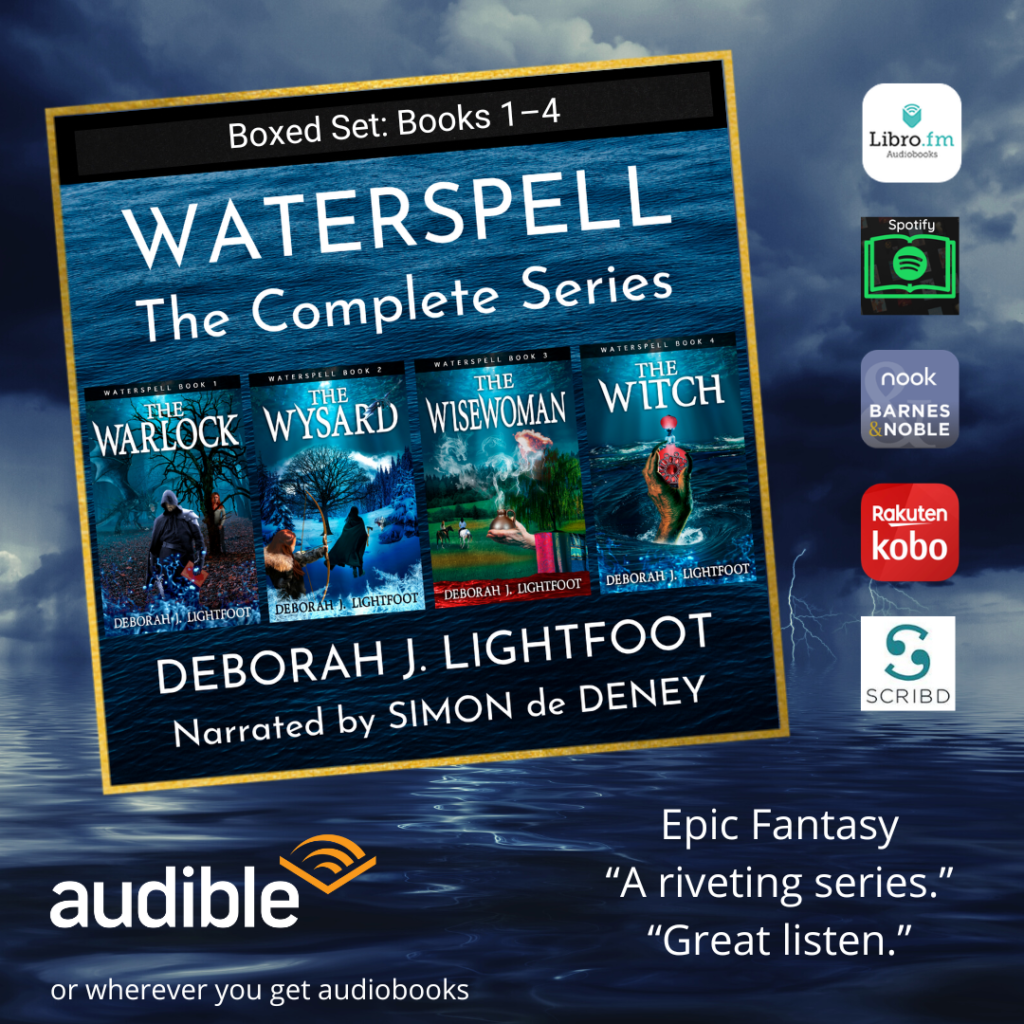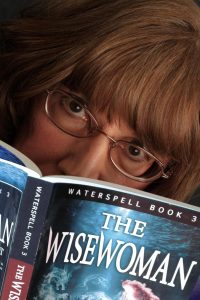 Q: What are these books about?
Q: What are these books about?
The Waterspell fantasy series follows the story of Carin, a lost traveler who embarks on a journey to discover her true identity and learn where she belongs. When she falls captive to a hot-tempered, secretive wizard, he draws her into schemes of magical power and possible murder. There’s a world to save, even if it costs Carin her life. The relationship between Carin and the wizard grows increasingly complex, balancing in a tense power struggle as, together, they navigate a world of dangers while yearning for redemption, a sense of belonging, and maybe a little unconventional romance.
Waterspell springs from the realm of epic fantasy (with an environmental fantasy twist). It’s got ancient and mysterious magic, a passage from one world to the otherworld, a (reluctant) Chosen One, and a Hero/Heroine’s Quest. It’s a portal fantasy with complex characters who become embroiled in mystery, murder, and a little slow-burning romance. Think “Jane Eyre meets a sorcerer.”
A synopsis:
Carin has no memory of her childhood, no home to go to, and nothing to rely on but the whispered advice of a village wisewoman. When she takes that advice and goes searching for her past, she falls captive to a quick-tempered wizard named Verek.
Verek subjects her to a series of tests—some mundane and some magical—to discover who and what she is. No natural creature of his world could defy his enchantments as Carin does. What gives her the power to resist him? Where is she from? Did somebody send her?
As the answers come to light, Carin discovers that Verek plans to use her as an expendable weapon in a battle to save his world from plague and pestilence. If Verek’s scheme fails, a lethal epidemic will overrun his world. If his plan succeeds, the dangerous wysard responsible for Carin’s abduction will die.
So will Carin.
Q: Can the books be read in any order?
A: That’s not recommended. The three books of the original trilogy are really the beginning, middle, and “end” of a continuous story, and should be read in order, as a set. There’s also a new-in-2022 Book 4 featuring the central characters after their first quests are ended and new problems arise.
Q: What’s the age range for this series?
A: Waterspell is high YA/crossover. Any fantasy enthusiast from 13 to 130 will enjoy these books.
Q: Where can I read reviews?
A: An extensive list is on the Reviews page of this site. Many reviews are also posted on Amazon.
Q: What formats are available?
- Ebooks are available for all formats: Kindle, Nook, Kobo, and all others.
- Paperbacks can be ordered from any bookstore, but I recommend you support your local independent bookstore by shopping at Bookshop.org.
- Audiobooks are available from many retailers. Please see the ever-expanding list at waterspell.net/audio. To support your favorite local bookstore, buy your audiobooks from Libro.fm.
From an interview at Mythical Books:
1. What should a fantasy book have to be a great one?
Strong, authentic, intriguing characters. An imaginative plot with twists, turns, and surprises, and some ambiguity—things left open to interpretation or left to the reader’s imagination. Plus graceful writing—a fluent voice and a style that soars. At its best, the fantasy genre boasts some of the most beautiful and evocative writing out there, and the most memorable characters.
2. Is impossible love an imperative ingredient for the fantasy genre? What brings such love?
Interesting question! Some might label as “impossible” the relationship between the hero and heroine of my Waterspell trilogy (Book 1: The Warlock, Book 2: The Wysard, and Book 3: The Wisewoman—the beginning, middle, and end of a continuous story). But I believe readers who approach Waterspell without preconceptions will realize that love does indeed conquer all. Maybe that’s the message in all stories of forbidden passion, from Beauty and the Beast through recent paranormal romances. True love overcomes any obstacle.
3. Why do we like (need) happy endings?
There’s trouble enough in the world today! Stories should end with hope, not tragedy.
4. How do you see the perfect fantasy character?
Flawed. A good character has flaws, and those flaws will be deeper, darker, and more damaging than the failings of ordinary people. My idea of a good fantasy hero/heroine is a character who might just as easily be the villain of the story.
5. In this explosion of fantasy/paranormal books, how hard is it to be original?
There are only six plots in the world (so I’ve heard), and conflict is the root of drama. The writer’s job is to bring freshness and imagination to the time-honored craft of storytelling. Originality springs from within. Writers make a mistake, I believe, when they consciously set out to be so “different” that their work ends up bizarre and inaccessible. Far better to tell the story that you have to tell, the story that is yours. Because I don’t want to be subconsciously influenced, I tend not to read many contemporary authors. Mostly I read the classics. My favorites: Jane Eyre. Wuthering Heights. Irish Fairy and Folk Tales. Ursula K. Le Guin’s Earthsea books. The science fiction/fantasy of Andre Norton. Anything by Edgar Allan Poe or Nathaniel Hawthorne.
—Deborah J. Lightfoot
From an interview at Laurie’s Paranormal Thoughts and Reviews:
1. At what point in your life did you realize you wanted to be a writer?
I’ve written since I was a kid. My childhood was secluded, growing up on a farm with few neighbors. In my isolation, I found writing to be a more natural form of communication than talking. Not having many people to talk to, I expressed myself in a diary, in letters, in imaginative scribblings. It felt natural. Still does. I’d much rather write than talk.
2. How do you describe your writing style?
Active. Lots of action, a proper pace (mostly fast but slower as needed), and realistic, sympathetic, believable characters. I know verbs are a writer’s best friends and I try to use them well. A carefully chosen verb can convey as much as a paragraph! A literary agent said of my work: “I was very impressed with the tautness of your writing—your avoidance of clichés, your fresh similes, your strong verb choices.”
Some might describe my style as “Brontian.” I admire Charlotte Bronte’s Jane Eyre and Emily’s Wuthering Heights. My dark, dangerous leading man, Lord Verek, owes aspects of his personality to Heathcliff and Rochester. And in my heroine, gutsy Carin, readers may catch echoes of a famously strong female character: Jane Eyre. Writers are shaped by what we read.
3. Lewis Carroll’s Through the Looking-Glass shows up in your trilogy, too. What made you give the Alice books a role?
The idea popped into my head when the warlock handed Carin a book that he couldn’t read, and she could. I knew the book’s title, Through the Looking-Glass, at almost the same instant Carin did. Eerie, how naturally it melded with my trilogy! They belonged together. I’m tempted to believe the Waterspell story is real—it’s a history of a world that accidentally obtained a copy of a Lewis Carroll classic. I just wrote down the events the way they happened. Carin uses Looking-Glass as a clue to help her unravel the mystery in which she finds herself entangled. The forgotten-but-familiar book is her tangible connection to another reality.
4. Plotter or Pantser? Why?
Definitely pantser. I knew where Waterspell began, and I had a vague idea of where it would end. But in between, the characters drove the plot. I didn’t know what would happen until it happened. Which is a revision-heavy, trial-and-error way to write a novel. I’m sure plotters write more efficiently, with their outlines and their fully-thought-out synopses. But I agree with Stephen King (On Writing: A Memoir of the Craft): “Stories,” he wrote, “are relics, part of an undiscovered pre-existing world. The writer’s job is to … get as much of each one out of the ground intact as possible.” That’s what Waterspell feels like to me: an account of real events. I couldn’t plot it beforehand because I was only following along, notepad in hand, to record the action.
5. Has someone been instrumental in inspiring you as a writer?
The science fiction/fantasy author Andre Norton was among my major early influences. To quote from her Wikipedia profile, under the heading of Recurring Motifs:
“Again and again in her works, alienated outsiders undertake a journey through which they realize their full potential … In most Norton books, whether science-fiction or fantasy, the plot takes place in the open countryside, with only short episodes in a city environment. Protagonists usually move about singly or in small groups, and in conflict situations they are more often scouts, spies or guerrillas rather than regular soldiers …
“As could be expected of such characters, they tend to be resourceful and capable of taking independent initiative … the protagonists (often young) are thrust into situations where they must develop quickly …”
That gives an excellent sense of my trilogy. My heroine is a teenager who undertakes a journey that taxes her resourcefulness to its limits. By story’s end, Carin is far along in realizing her full potential. Clearly, I’m influenced by all the Norton books I devoured in my adolescence.
6. How did you arrive at the series title?
Stand beside a thundering waterfall, walk in a rainstorm, or listen to ocean waves pound the shore. You’ll fall under a “water spell.” Water is magical. In the mythologies of many cultures, rivers and other bodies of water are sacred. Fantastical beings live in water: mermaids, sirens, the Lady of the Lake. In my story, too, water has magical properties. For my characters, it is both a portal and a source of power. Carin (she’s a Pisces) is in her element there. Scorpio is also a water sign, and Verek is the quintessential Scorpio: dangerous, secretive, proud, but loyal and passionate. The “water” in the title reflects the oceanic symbolism in my trilogy. It’s there in the beautiful blue covers, too.
7. Do you consider Waterspell to be a romance?
Romantic elements are inseparably intertwined with the main storyline. From page one, the hero and the heroine find each other perilously intriguing, but they are mutually mistrustful. Combative. One reviewer described their relationship as “balancing in a tense power struggle,” which is a great way to phrase it. Neither knows what to make of the other. But suppressed feelings have ways of cracking the toughest emotional armor. As the tension rises between these two, it’s an open question: Will they or won’t they? Will love blossom amidst the shared dangers and cosmic catastrophes?
Mix environmental fantasy with magic, mystery, and romance, add dystopian undercurrents, and that’s Waterspell—a cross-genre story with too many layers for a single label.
—Deborah J. Lightfoot









